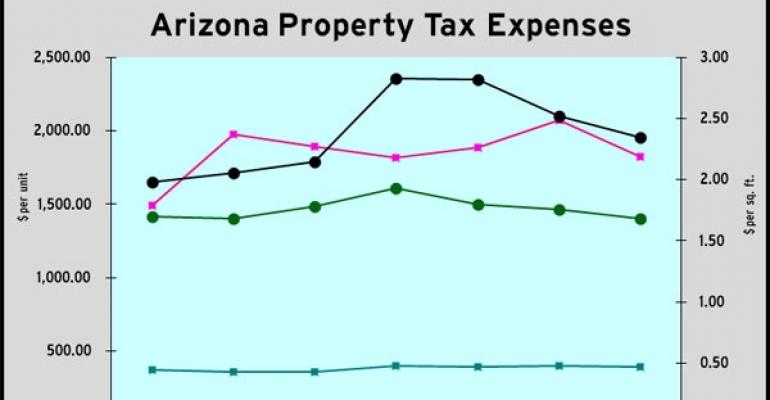As 2012 begins, the real estate collapse ravaging Phoenix continues. Phoenix real estate prices have fallen from their height in early 2008 by 28 percent for retail, 52 percent for industrial and 71 percent for office, according to Navigant Capital Advisors, a Chicago-based investment bank. Phoenix ranks No. 7 on Real Capital Markets’ list of the most distressed U.S. markets for commercial real estate.
The city’s delinquency rate for commercial mortgage-backed securities (CMBS) loans is the third-highest in the nation, accounting for 3.6 percent of total U.S. CMBS delinquencies. And Phoenix’s delinquency count is expected to increase next year.
The “new normal” for Phoenix is likely a prolonged era of deleveraging as the market absorbs these distressed assets. For Arizona property owners, the decline in real estate values has not always translated into a commensurate drop in taxes, however. This has occurred for three reasons.
First, the general decline in assessed property values has not kept pace with the actual decline in asset prices. Second, even though taxable property values have dropped, Maricopa County, where Phoenix is located, has increased its property tax rates: for fiscal 2011, tax rates increased by 18 percent from the previous year.
The third and final reason stems from Arizona’s unique system of calculating property tax liability from two statutory values – a full cash value and a limited property value. A property’s full cash value can decline while its limited property value, determined statutorily, increases, causing an escalation in tax liability.
Taxpayers must be diligent to ensure they are paying no more than their fair share of taxes. Consider the following points before deciding whether an appeal may be beneficial.
Start early
Arizona’s property tax system is complex, difficult to navigate, and requires perseverance. Tax year 2013 property tax notices will be mailed in February 2012. The system entails multiple forms and filing deadlines which, if missed, will result in a taxpayer losing appeal rights.
The process will conclude in October 2012 with State Board of Equalization hearings. Owners should start planning now to challenge their 2013 tax assessments. To do so, they should pay close attention to how their properties are assessed.
Mass appraisal?
To determine if a property has been overvalued, it is important to understand that assessors use computer-based statistical models to derive value. These models have several limitations that can result in a property being over-valued.

First, the assessor’s valuation of an individual property is only as accurate as the data and assumptions used in the statistical model to generate a value for a given submarket. The value created by a mass appraisal system may not account for the specific characteristics of a property, which may make it less valuable than predicted by the mass appraisal model.
Second, the mass appraisal system is dependent on cor¬rect, complete, and current property data. Oftentimes, the data that assessors use is not only incorrect but outdated by as much as six to eight months, which can inflate assessments. Part of the reason for outdated data is the existence of statutory cut-off dates for collecting data.
Valuation approach
While appraisers use three generally accepted approaches to value - the cost approach, the sales comparison approach, and the income capitalization approach - the appropriate valuation method depends on the property type. In Maricopa County, assessors value 70 percent of commercial properties using the cost approach, which measures the current replacement cost of the improvements minus depreciation, plus the value of the site. But the application of the cost approach in real estate transactions is limited and is rarely used by investors to determine market value. In a depressed real estate market, the use of the cost approach typically results in an assessment that exceeds market value unless all forms of depreciation, especially obsolescence, are deducted.
Market value vs. property tax value
Even if an owner believes the assessor’s valuation is reasonable based on his/her understanding of market value in the business world, the property may still be overvalued. Market value as commonly understood differs from property tax value in two key respects. First, Arizona law requires assessors to determine full cash value based on a property’s current use, rather than its highest and best use. In many instances these two value concepts produce radically different values.
Second, market value for property tax purposes is limited to the value of the real estate. Arizona law prohibits the inclusion of personal and intangible property in the assessor’s valuation.
Limiting assessments to real property is crucial to lowering the taxes of businesses such as hotels, assisted living facilities, and shopping centers and malls, which derive significant income from personal property and intangibles.
Because of the many deadlines, procedures, and valuation methods used, owners should begin reviewing their property tax values now to maximize their chances for success.
Douglas S. John is an attorney in the Tucson, Ariz. law firm of Bancroft & John, P.C., the Arizona and Nevada member of American Property Tax Counsel, the national affiliation of property tax attorneys.

